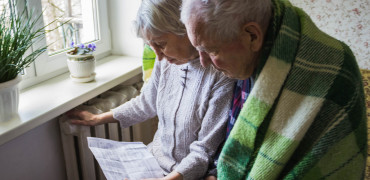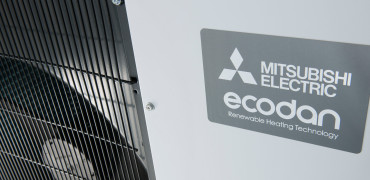The UK has ambitious plans in place to reach net-zero greenhouse gas emissions by 2050, and with 20% of emissions generated by the UK’s housing stock, decarbonising homes plays a key role.
In addition to this, there is an increasing demand from the public and a real shift in consciousness in recent years, with people wanting to live in environmentally friendly spaces.
In the latest of the ‘Serious about sustainability’ podcast, I interview Rob Hicks, Innovation Manager at Sovereign Housing to talk about the role of social housing providers in helping the country get to net zero.
The podcast looks at what Sovereign are doing to reduce carbon emissions in their housing stock and what differences there were in coping with new build as opposed to retrofit.
The social housing sector has willingly adopted affordable warmth initiatives, environmental issues and finding ways to reduce carbon emissions in their buildings and this is true of Sovereign Housing.
When you look at the fact that home heating contributes between 15%-20% of all UK emissions, it is easy to see why this is such an important area to tackle carbon reduction.
The technology to do this already exists and there is now a decade of experience in social housing
Increasing EPC ratings
Sovereign has encompassed this in its replacement strategy which is all about getting all of its properties into the Energy Performance Certificate (EPC) band C by 2035. The housing provider also has the ambition of getting properties to net zero by 2050 or before.
The strategy is a simple recipe of first, looking at the fabric of the property, to see what can be improved or upgraded. This might be as simple as adding loft insulation, or might call for cavity wall insulation. It could involve replacing the windows to install double or triple glazing and Rob explains that it also includes looking at the ventilation so that the homes do not become air tight boxes, lacking fresh air.
Following this, the core element is the heating system and Sovereign have found air source heat pumps to be a perfect match for bungalows and houses in their portfolio. Rob explains that it can be a little trickier to make these work with apartments and flats but it is not impossible.
After looking at the envelope of the property in terms of cavity walls, loft insulation, double glazing, etc, adding an air source heat pump can get the properties into EPC Band C or higher, which achieves the initial aims of Sovereign of getting all of its properties into EPC band C by 2035.
Rob feels that heat pumps are truly renewable and easy to maintain. They are also becoming even simpler to use, which is really important for tenants, who just want reliable hot water.
At the same time, modern control systems can provide a huge amount of useful data that can be used to analyse the performance of the building and help with maintenance regimes.
The housing association is also analysing data from more than 10 years of using heat pumps and looking at how they can make each property self-sufficient using Photovoltaics and battery storage to get the homes near to net zero.
Lean and mean
This fabric-first is certainly the approach that heat pump manufacturer Mitsubishi Electric advocates – making sure that the fabric of the building is as energy efficient as possible first, so that the heating technology can work as efficiently as possible.
As Max explains, it’s what is called a ‘Lean, Mean, Green’ approach and by this, we mean be ‘Lean’ and reduce the need for overall energy consumption first. Look at the fabric of the building by stopping heat loss and leaks, and improving the overall insulation.
Then you should take a ‘Mean’ approach, where any energy used in the property is used as efficiently as possible. Low energy lightbulbs are an easy example but any electrical appliance should be looked at to ensure that it is as efficient as possible.
The same applies to the heating system but this is where the ‘Green’ approach kicks in.
It is still easy to just replace an existing oil or gas boiler and a modern boiler will increase the efficiency of the heating system over an antiquated boiler.
However, this is simply not sustainable into the future and does nothing to decrease the carbon footprint of either the home, or the housing association.
And this is where air source heat pumps really come into their own as they are now a reliable, proven technology and, in the case of the Ecodan range, are built in the UK and designed specifically for UK conditions.
Proven technology
Mitsubishi Electric has seen tens of thousands of heat pumps installed up and down the country in the past decade, in everything from modern new-build, upgraded homes, ancient, listed buildings, and in both single properties and whole apartment blocks.
Whichever renewable heating system you look at though, Max stresses the importance of looking at performance, reliability and operating noise levels as these will have a real impact on acceptance with tenants, keeping them warm and happy throughout the winter.
“We always stress the need to look at Seasonal Efficiency rather than the standard performance levels written in the sales blurb,” he explains, “for me, it’s comparable with miles per gallon with a car. You know it won’t achieve the manufacturers claims and it’s not until you get on the road where you really see what the performance is.”
The same is true of any heating system so it is always worth asking about seasonal efficiency.
Overall it looks likely that the majority of UK housing can be upgraded and improved and therefore help the nation achieve the ambitious carbon reduction targets by the 2050 deadline.
The future is already here
The technology to do this already exists and there is now a decade of experience in social housing providers such as Sovereign showing how it can be done.
And it is worth remembering that the key reason this is being looked at is to help tackle fuel poverty and provide tenants with warm, affordable heating, all year round.
“Our customers are the prime driver and affordable warmth is the key point,” explains Rob, “we are finding systems that will keep them warm and be as cheap to run as possible and be as sustainable as possible
In the case of Sovereign, Rob explains that this has seen tenants reduce their heating bills on average from around £1,200 a year to £500 or below.
Surveys of tenants have also shown an increase in the warmth rating os some properties from 1 out of 5, to 5 out of 5, after improvement works and the fitting of the air source heat pump.
The tonnage of carbon emissions from properties has also dropped from around 4.5 tonnes down to 1.8 tonnes and that’s per property, so if you look at this over the whole property portfolio, that is going to be massive carbon saving for the housing association.
Max Halliwell, communications manager for Heating and Ventilation



